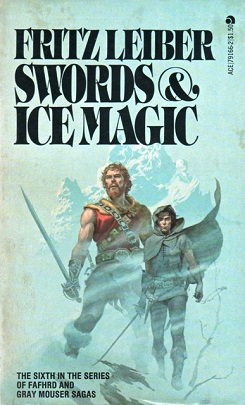Related Research Articles

Fritz Reuter Leiber Jr. was an American writer of fantasy, horror, and science fiction. With writers such as Robert E. Howard and Michael Moorcock, Leiber is one of the fathers of sword and sorcery.

Sword and sorcery (S&S), or heroic fantasy, is a subgenre of fantasy characterized by sword-wielding heroes engaged in exciting and violent adventures. Elements of romance, magic, and the supernatural are also often present. Unlike works of high fantasy, the tales, though dramatic, focus on personal battles rather than world-endangering matters. The genre originated from the early-1930s works of Robert E. Howard. While there is a chance example from 1953, Fritz Leiber re-coined the term "sword and sorcery" in the 6 April 1961 issue of the fantasy fanzine Ancalagon, to describe Howard and the stories that were influenced by his works. In parallel with "sword and sorcery", the term "heroic fantasy" is used, although it is a more loosely defined genre.

Fafhrd and the Gray Mouser are two sword-and-sorcery heroes appearing in stories written by American author Fritz Leiber. They are the protagonists of what are probably Leiber's best-known stories. One of his motives in writing them was to have a couple of fantasy heroes closer to true human nature than the likes of Howard's Conan the Barbarian or Burroughs's Tarzan.

Dangerous Visions is an anthology of science fiction short stories edited by American writer Harlan Ellison and illustrated by Leo and Diane Dillon. It was published in 1967 and contained 33 stories, none of which had been previously published.

The Magazine of Fantasy & Science Fiction is a U.S. fantasy and science-fiction magazine, first published in 1949 by Mystery House, a subsidiary of Lawrence Spivak's Mercury Press. Editors Anthony Boucher and J. Francis McComas had approached Spivak in the mid-1940s about creating a fantasy companion to Spivak's existing mystery title, Ellery Queen's Mystery Magazine. The first issue was titled The Magazine of Fantasy, but the decision was quickly made to include science fiction as well as fantasy, and the title was changed correspondingly with the second issue. F&SF was quite different in presentation from the existing science-fiction magazines of the day, most of which were in pulp format: it had no interior illustrations, no letter column, and text in a single-column format, which in the opinion of science-fiction historian Mike Ashley "set F&SF apart, giving it the air and authority of a superior magazine".

Unknown was an American pulp fantasy fiction magazine, published from 1939 to 1943 by Street & Smith, and edited by John W. Campbell. Unknown was a companion to Street & Smith's science fiction pulp, Astounding Science Fiction, which was also edited by Campbell at the time; many authors and illustrators contributed to both magazines. The leading fantasy magazine in the 1930s was Weird Tales, which focused on shock and horror. Campbell wanted to publish a fantasy magazine with more finesse and humor than Weird Tales, and put his plans into action when Eric Frank Russell sent him the manuscript of his novel Sinister Barrier, about aliens who own the human race. Unknown's first issue appeared in March 1939; in addition to Sinister Barrier, it included H. L. Gold's "Trouble With Water", a humorous fantasy about a New Yorker who meets a water gnome. Gold's story was the first of many in Unknown to combine commonplace reality with the fantastic.

DAW Books is an American science fiction and fantasy publisher, founded by Donald A. Wollheim, along with his wife, Elsie B. Wollheim, following his departure from Ace Books in 1971. The company claims to be "the first publishing company ever devoted exclusively to science fiction and fantasy." The first DAW Book published was the 1972 short story collection Spell of the Witch World by Andre Norton.
Whispers was one of the new horror and fantasy fiction magazines of the 1970s.

Our Lady of Darkness (1977) is an urban fantasy novel by American author Fritz Leiber. The novel is distinguished for three elements: the heavily autobiographical elements in the story, the use of Jungian psychology that informs the narrative, and its detailed description of "megapolisomancy", a fictional occult science. It was originally published in shorter form as The Pale Brown Thing.

The 28th World Science Fiction Convention (Worldcon), also known as Heicon '70, was held on 20–24 August 1970 at the Stadthalle Heidelberg in Heidelberg, West Germany.

Swords and Ice Magic is a fantasy short story collection, first published in 1977, by American writer Fritz Leiber, featuring his sword and sorcery heroes Fafhrd and the Gray Mouser. It is chronologically the sixth volume of the complete seven volume edition of the collected stories devoted to the characters. It was first published in paperback format during July 1977 by Ace Books company, which reprinted the title numerous times through 1990; a later paperback edition was issued by Dark Horse (2007). It has been published in the United Kingdom by Mayflower Books and Grafton. The first hardcover edition was issued by Gregg Press during December 1977. The book has also been gathered together with others in the series into various omnibus editions; Swords' Masters (1990), Return to Lankhmar (1997), and The Second Book of Lankhmar (2001).

Heroes and Horrors is a collection of fantasy and horror short stories by American writer Fritz Leiber, edited by Stuart David Schiff and illustrated by Tim Kirk. It was first published in hardcover in December 1978 by Whispers Press, and in paperback in August 1980 by Pocket Books. The paperback edition omits the illustrations.

The Second Book of Fritz Leiber is a collection of short stories and articles by American writer Fritz Leiber. It was first published in paperback in January 1975 by DAW Books. It was later gathered together with The Book of Fritz Leiber into the hardcover omnibus collection The Book of Fritz Leiber, Volume I & II.

This is a bibliography of works by Fritz Leiber.

The 1976 Annual World's Best SF is an anthology of science fiction short stories edited by Donald A. Wollheim and Arthur W. Saha, the fifth volume in a series of nineteen. It was first published in paperback by DAW Books in May 1976, followed by a hardcover edition issued in August of the same year by the same publisher as a selection of the Science Fiction Book Club. For the hardcover edition the original cover art of Jack Gaughan was replaced by a new cover painting by Chet Jezierski. The paperback edition was reissued by DAW in December 1981 under the variant title Wollheim's World's Best SF: Series Five, this time with cover art by Oliviero Berni. A British hardcover edition was published by Dennis Dobson in March 1979 under the variant title The World's Best SF 3.

Conjure Wife (1943) is a supernatural horror novel by American writer Fritz Leiber. Its premise is that witchcraft flourishes as an open secret among women. The story is told from the point of view of a small-town college professor who discovers that his wife is a witch.
The Balrog Awards were a set of awards given annually from 1979 to 1985 for the best works and achievements of speculative fiction in the previous year. The awards were named after the balrog, a fictional creature from J. R. R. Tolkien's Middle-earth legendarium. The awards were originally announced by editor Jonathan Bacon in Issue #15 of Fantasy Crossroads and presented at the Fool-Con II convention on April Fool's Day, 1979 at Johnson County Community College, Kansas. The awards were never taken seriously and are often referred to, tongue-in-cheek, as the "coveted Balrog Awards".
"Catch That Zeppelin!" is a 1975 alternate history short story by American writer Fritz Leiber. It was first published in The Magazine of Fantasy and Science Fiction.

Nebula Award Stories 3 is an anthology of award-winning science fiction short works edited by Roger Zelazny. It was first published in the United Kingdom in hardcover by Gollancz in November 1968. The first American edition was published by Doubleday in December of the same year. Paperback editions followed from Pocket Books in the U.S. in February 1970, and Panther in the U.K. in November 1970. The American editions bore the variant title Nebula Award Stories Three. The book was more recently reissued by Stealth Press in hardcover in June 2001. It has also been published in German.

Nebula Awards 28 is an anthology of award winning science fiction short works edited by James Morrow, the third of three successive volumes under his editorship. It was first published in hardcover and trade paperback by Harcourt Brace in April 1994. The book has also been translated into Polish.
References
- ↑ The 2nd World Fantasy Convention, at WorldFantasy.org; retrieved March 12, 2020
- ↑ Fritz Leiber, by Malcolm Edwards and John Clute, in The Encyclopedia of Science Fiction ; last updated February 7, 2019; retrieved March 12, 2020
- ↑ REVIEW: Fritz Leiber: Selected Stories edited by Charles N. Brown and Jonathan Strahan, by John DeNardo; at SF Signal ; published April 20, 2010; retrieved March 12, 2020